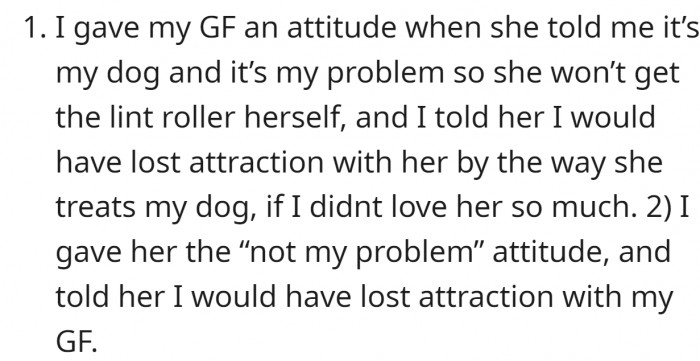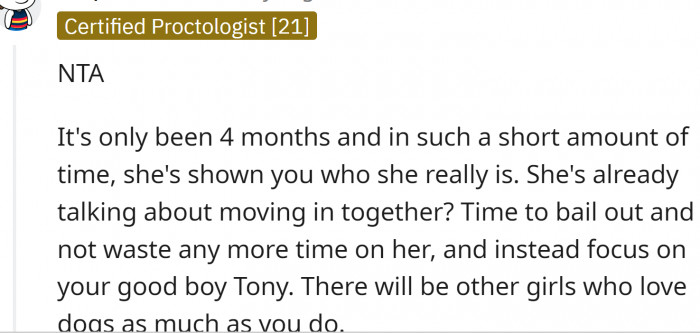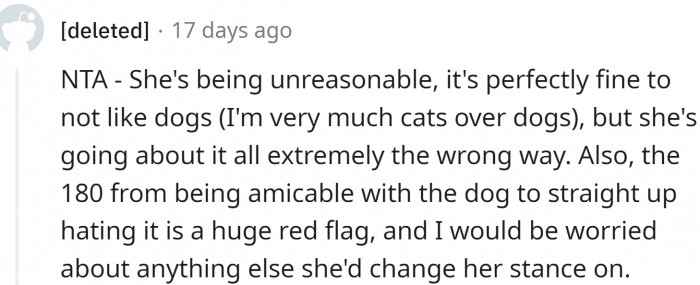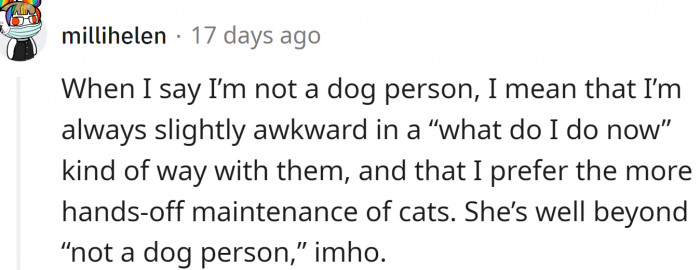Redditor Wants To Break Up With His Girlfriend Because Of The Way She Treats His Dog
There are people who tolerate dogs and people who love dogs. And, of course, there are people who don’t like dogs at all.
There is a significant difference between them, and that difference is particularly noticeable in dating and relationships.
Namely, dog people and those who can tolerate dogs can date and be in a marriage, and it can work.
However, people who love dogs and those who can’t stand them don’t mix at all. There are huge differences that simply can’t be ignored.
Some people can pretend for a certain period, but their true feelings will surface eventually. We have one of those stories today. OP has a dog, and his girlfriend told him she was fine with it.
But as things progressed, she started showing hostility toward the dog, and he simply couldn’t stand by and watch his best friend get maltreated.
So, he confronted her, and it didn’t go well.
"The conversation then evolved to her saying that when we move out, Tony can’t be with us, disregarding the fact that she knows how much I love him, and her (previously) saying she was going to be okay with Tony living with us."
Now, this Redditor asks: “AITA for telling my girlfriend how I feel about the way she treats my dog?” Read this interesting story in full below:
OP asks:

He has a 6-year-old German Shepherd, Tony, and he has a girlfriend.

He finally told her how he feels about the way she treats his dog.

Exploring Unconditional vs. Conditional Love
Dr. John Gottman, a renowned relationship researcher, emphasizes the importance of understanding love's dynamics in relationships.
In his work, Gottman illustrates how unconditional love often fosters deeper bonds, while conditional love can lead to resentment and distance.
This tension regarding the treatment of the dog may symbolize deeper issues of acceptance and emotional support within the relationship.
Understanding Unconditional vs. Conditional Love
The distinction between unconditional and conditional love is paramount in relationships, particularly when pets are involved. According to Dr. Gary Chapman, author of 'The Five Love Languages,' unconditional love fosters deep emotional connections. In this case, the girlfriend's behavior toward the dog reflects a conditional love that raises concerns about her capacity for empathy and nurturing.
Research shows that individuals who struggle with unconditional love may have attachment issues stemming from their upbringing, affecting their ability to form secure relationships.
Her disliking the dog is pretty obvious.

She told him to fix this problem, but OP thinks she is the problem.

She told OP she didn't want the dog to move in with them. OP responded that he loved the dog more than he loved her.

Research in the field of attachment theory suggests that individuals with secure attachments are better equipped to express love and care for others, including pets.
When partners have differing views on how to treat a beloved pet, it can reflect broader discrepancies in emotional availability and support.
Recognizing these patterns can help partners navigate their differences more effectively.
Moreover, the original poster's concern for his dog's well-being highlights the importance of shared values in relationships. Studies indicate that partners who prioritize similar values are more likely to experience satisfaction and stability. The differing attitudes toward the dog may indicate deeper compatibility issues that warrant exploration.
OP has offered the following explanation for why they think they might be the asshole:

"You are pointing out why you are incompatible."

Basic incompatibility. And it’s only been four months. What's next?

The Role of Empathy in Relationships
Empathy is a cornerstone of healthy relationships, as highlighted by Dr. Brené Brown, a leading researcher on vulnerability and connection.
Her work suggests that when partners struggle to show empathy toward each other's feelings, it can create significant relational strain.
In this scenario, the girlfriend's treatment of the dog may indicate an inability to empathize with the boyfriend's attachment and feelings toward his pet.
The Role of Empathy in Pet Ownership
Empathy plays a critical role in responsible pet ownership and is essential for fostering healthy relationships. According to Dr. Simon Baron-Cohen, a leading expert in empathy research, the ability to understand and share the feelings of others is foundational for nurturing bonds. The girlfriend's lack of empathy toward the dog suggests a potential disconnect that could extend to her relationship with the original poster.
Understanding how to cultivate empathy can significantly improve interactions between partners and their pets, ultimately enhancing the quality of relationships.
"This won’t end with your dog."

"She's talking about moving in together?"

The way she is treating his dog tells a lot about who she is as a person.

Behavioral psychology indicates that our treatment of pets can reflect our underlying emotional states and attitudes.
When one partner is dismissive or neglectful of a pet, it may signal unresolved issues regarding commitment or emotional support in the relationship.
Understanding these connections can help couples address the root causes of their conflict.
Additionally, exploring the underlying reasons for the girlfriend's behavior is essential. Research from the American Psychological Association indicates that individuals who exhibit neglectful behaviors often have unresolved emotional issues that affect their relationships. Understanding these dynamics can help the original poster approach the conversation with compassion and insight.
Unconditional love vs. conditional love.

Is this situation going to get better?

Redditor said:

Strategies for Building Empathy and Understanding
Dr. Marshall Rosenberg's Nonviolent Communication (NVC) framework offers effective strategies for enhancing empathy in relationships.
By teaching partners to express their feelings and needs without judgment, NVC can facilitate deeper understanding and connection.
Implementing these techniques can help both partners feel heard and valued, ultimately strengthening their bond.
Addressing Compatibility Issues
Compatibility in relationships extends beyond shared interests; it encompasses values and emotional responses as well. Studies show that partners who align on fundamental values are more likely to experience long-term satisfaction. In this case, discussing their differing perspectives on pet care can illuminate deeper compatibility issues that may need to be addressed.
Open dialogue about expectations and values can provide clarity and help both individuals understand each other's motivations.
Why doesn't OP already have a lint roller?

A bit of humor here:

They've been together for only four months...

Moreover, engaging in couple's therapy can facilitate these discussions in a safe and structured environment. Research indicates that couples who seek therapy often find new ways to communicate and resolve differences. A professional can help them explore their feelings and values concerning pet ownership, ultimately strengthening their relationship.
It's perfectly fine to not like dogs, but she's going about it all extremely the wrong way.

This Redditor is right:

The bottom line is:

Fostering a Shared Vision for Pet Care
Creating a shared vision for pet care can enhance emotional connections between partners. According to Dr. John Gottman, fostering shared goals is crucial for relationship satisfaction. The original poster could encourage discussions about what pet ownership means to each of them, exploring their hopes and expectations.
By aligning their values and responsibilities regarding the dog, they can create a more collaborative partnership that honors both their emotional needs.
As one Redditor put it, this is a case of unconditional love vs. conditional love. We can’t really advise OP on what to do, but he is not an A-hole here.
He loves his dog; he has been his best friend for six years, and now this girl, who entered his life just four months ago, wants him to change everything. She is asking a lot.
And who knows where it will end.
In conclusion, navigating the complexities of pet ownership requires an understanding of emotional dynamics and shared values. By fostering open communication and empathy, couples can enhance their relationship while ensuring their pet's well-being. Ultimately, addressing these issues head-on can lead to a more fulfilling partnership for both individuals.
Psychological Analysis
This situation underscores the importance of empathy and shared values in relationships. It's crucial for partners to engage in open dialogue about their emotional responses to pet ownership to foster understanding. Addressing these issues can significantly enhance their relationship and promote a healthier environment for their pet.
Analysis generated by AI
Analysis & Alternative Approaches
In summary, understanding the emotional dynamics related to pet ownership can significantly impact relationship satisfaction. By fostering open dialogue and aligning values, couples can navigate their differences and create a more harmonious environment. As noted in research from the American Psychological Association, shared goals and mutual understanding are essential for lasting relationships.
Analysis & Alternative Approaches
Navigating love and emotional support can be complex, particularly when pets are involved.
According to research from psychology journals, fostering empathy and understanding is critical for healthy relationships.
With the right tools, couples can work through their differences and enhance their emotional connection.



